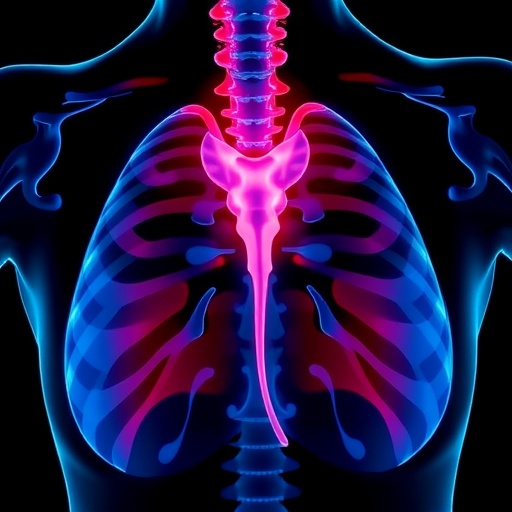A groundbreaking multi-institutional study spearheaded by UCLA Health Jonsson Comprehensive Cancer Center investigators has spearheaded new understanding in the treatment impact on early-stage cervical cancer, revealing nuanced insights into patient quality of life during and after therapy. This pivotal phase III clinical trial provides the first U.S.-based prospective collection of patient-reported outcomes in this patient subset, marking a significant advance in patient-centered cancer research.
Historically, cervical cancer trials have predominantly concentrated on survival metrics such as overall survival and recurrence-free survival. While these measures are invaluable, they fall short of encompassing the full spectrum of treatment consequences that patients endure. Patient-reported outcomes fill this critical gap by directly capturing the lived experience of those undergoing therapy, including the severity and duration of side effects, symptom burden, and overall well-being.
In this extensive randomized study, 316 women diagnosed with stage I/IIA intermediate-risk cervical cancer who had undergone radical hysterectomy and pelvic lymphadenectomy were enrolled. Participants were randomized into two arms: one receiving adjuvant radiation therapy alone, and the other receiving a combination of radiation and chemotherapy. The primary objective was twofold: to assess whether adding chemotherapy improved recurrence-free survival and to meticulously document the impact on patients’ quality of life over time.
Quality of life was quantitatively assessed using the Functional Assessment of Cancer Therapy-Cervix (FACT-Cx) Trial Outcome Index (TOI), a validated instrument tailored to measure domains vital to cervical cancer patients, including physical well-being and everyday functioning. Questionnaires were administered at baseline (pre-treatment), as well as at three, seven, and 36 weeks following treatment initiation, ensuring high completion rates exceeding 80% at each time point.
Analysis revealed a pronounced short-term decrement in quality of life among women receiving combined modality treatment relative to radiation alone. By the three-week mark, the FACT-Cx TOI scores were on average 5.1 points lower in the combined therapy group, widening to a 6.3-point deficit by seven weeks, a clinically significant difference denoting greater physical and functional challenges. This period coincides with the peak window of treatment-induced toxicities and symptom exacerbation.
Interestingly, despite these early treatment-related declines, longitudinal follow-up demonstrated convergence in quality of life metrics by the nine-month assessment. At this stage, patients in both cohorts reported a return to baseline levels in terms of pain, gastrointestinal discomfort, and urinary symptoms. These findings underscore the transient, yet intense, nature of the adverse effects experienced during the acute treatment phase.
Clinically, the trial’s findings bear substantial implications. Notably, the addition of chemotherapy to radiation did not confer statistically significant improvements in recurrence-free survival among the studied population. However, it was associated with a higher short-term symptom burden and decreased quality of life, delineating a clear risk-benefit profile that clinicians must navigate.
Dr. Dana Chase, the study’s principal investigator and a professor of obstetrics and gynecology at UCLA’s David Geffen School of Medicine, emphasized the imperative of integrating supportive care strategies during the critical three to seven-week treatment interval. This phase marks the nadir of patient well-being and could be mitigated through interventions aimed at symptom management, nutritional support, and psychosocial care.
The trial also innovatively captures patient voices in detailing side effect profiles encompassing gastrointestinal issues, neuropathy, and hematologic toxicities. Such granular data advocate for personalized medicine approaches, tailoring adjunctive therapies to ameliorate specific symptom burdens and optimize functional recovery.
Moreover, the study propels the oncology research community toward a paradigm shift embracing patient-centered endpoints as benchmarks for treatment evaluation. By incorporating systematic patient-reported outcomes in clinical trials, future research can holistically balance efficacy with tolerability, ultimately enriching shared decision-making between patients and providers.
Funding support from the National Cancer Institute and NRG Oncology facilitated this landmark trial, reflecting a collaborative commitment to advancing care standards for women afflicted by cervical cancer. The research has been peer-reviewed and published in the esteemed journal Gynecologic Oncology, signaling its significance within the oncological field.
Looking ahead, investigators advocate for designing next-generation clinical trials that integrate targeted interventions to preemptively address and mitigate side effects throughout the treatment course. Such trials could explore novel supportive care modalities, including pharmacologic agents, rehabilitative therapies, and integrative medicine approaches, all aimed at preserving quality of life without compromising oncologic outcomes.
In sum, this seminal study elucidates the critical trade-offs inherent in combining chemotherapy with radiation for early-stage cervical cancer. While survival benefit may be absent, the substantial, albeit temporary, decline in patient-reported quality of life serves as a clarion call for enhanced supportive care frameworks and patient-centric research agendas.
Subject of Research: Patient-reported outcomes and quality of life in early-stage intermediate-risk cervical cancer treatment
Article Title: Impact of Combined Chemoradiation vs. Radiation Alone on Quality of Life in Early-Stage Cervical Cancer: A Prospective Phase III Clinical Trial
News Publication Date: Not specified
Web References:
https://www.gynecologiconcology-online.net/article/S0090-8258(25)01011-X/fulltext
http://dx.doi.org/10.1016/j.ygyno.2025.09.014
References: Published study authors include Dr. Dana Chase and Dr. Sang Young Ryu, et al., Gynecologic Oncology
Keywords: Cervical cancer, quality of life, chemoradiation, radiation therapy, patient-reported outcomes, clinical trial, gynecologic oncology, supportive care, toxicity, survival outcomes
Tags: adjuvant therapy in cervical cancercervical cancer treatment outcomeschemotherapy and radiation combination effectsearly-stage cervical cancer studyimpact of chemotherapy on well-beingnuanced insights in cancer treatment effectspatient-centered cancer carepatient-reported outcomes in cancer researchphase III clinical trial in oncologyquality of life decline in cancer patientsradical hysterectomy and pelvic lymphadenectomysymptom burden in cervical cancer therapy





